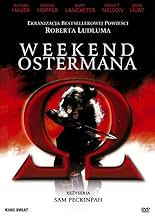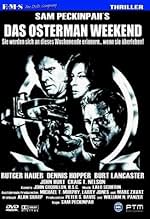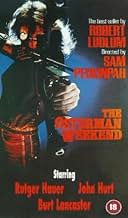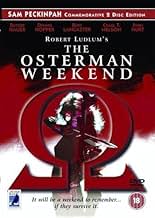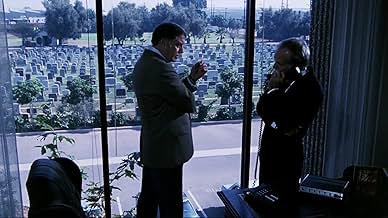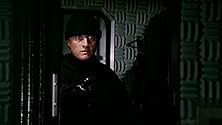CALIFICACIÓN DE IMDb
5.8/10
9.8 k
TU CALIFICACIÓN
Durante la Guerra Fría, la CIA le pide a un polémico periodista de televisión que convenza a algunos de sus conocidos, agentes soviéticos de la red Omega, de que deserten.Durante la Guerra Fría, la CIA le pide a un polémico periodista de televisión que convenza a algunos de sus conocidos, agentes soviéticos de la red Omega, de que deserten.Durante la Guerra Fría, la CIA le pide a un polémico periodista de televisión que convenza a algunos de sus conocidos, agentes soviéticos de la red Omega, de que deserten.
- Dirección
- Guionistas
- Elenco
- Premios
- 2 premios ganados en total
- Dirección
- Guionistas
- Todo el elenco y el equipo
- Producción, taquilla y más en IMDbPro
Opiniones destacadas
Action movie in Peckinpah style with tension , intrigue , thrills , gushing blood and violence . The one weekend of the year you won't want to miss. The host of an investigative news spectacle (Rutger Hauer,first major character in a Hollywood movie played by Dutch actor) is assigned a dangerous mission As TV show hosted by television journalist John Tanner is called "Face to Face" and he is convinced by a CIA operative (John Hurt was second billed) that the friends (Chris Sarandon , Dennis Hooper , Craig T Nelson) and wives (Helen Shaver ,Cassie Yates) he has invited to a weekend party are Russian spies from a secret organization . The name of the Soviet spy network was "Omega".
This actioner and suspenseful movie tells a convoluted and complicated tale of vendetta , espionage and treason . Interesting but slightly boring spy film , including an overly complex and confusing script , even though at times it is admittedly engrossing . The picture was made and released about eleven years after its source novel of the same name by Robert Ludlum had been first published in 1972 . Sam Peckinpah was fired as director during post-production. Others were Convoy and Ride the High County . When he refused to re-edit Osterman weekend after it was screened for a test audience and met with a confused and extremely mixed reaction. Producers took over the editing with the assistance of the editor , drastically altering opening and ending sequences. Mediocre and dark cinematography by John Coquillon , in fact , the picture involved a considerable amount of filming at night. It was filmed at a 1950s ranch located in upper Mandeville Canyon in the Hollywood Hills , it was a property once owned by Robert Taylor and has been frequently been known by the names the "Taylor Estate" . Anti-climatic soundtrack by Lalo Schifrin composed by means by synthesizer . Director Don Siegel, long time friend and mentor to Sam Peckinpah, recommended Lalo Schifrin as the film's composer. Schifrin had scored five of Siegel's movies ; composer Lalo Schifrin had to sit by Sam Peckinpah's sick bed in order to spot the film and decide which scenes did or did not need music.
Final film of director Sam Peckinpah. The picture was also Peckinpah's big "comeback movie", it was his first in five years, his last film having been at the time Convoy back in 1978 . The movie is also Peckinpah's only feature film of the 1980s decade . The production shoot for this film ran for fifty-four days . Director Sam Peckinpah was in ill-health throughout the shoot as the long-term toll of his drug and alcohol abuse suggested to many in the production that he was dying. Peckinpah after beginning as a writer , was soon involved in TV Westerns at the peak of his popularity ; shooting series just like ¨¨The Westener¨, ¨Gunsmoke¨and most popular ¨Rifleman¨, moving into films by 1961 when he made nice impression with ¨The deadly companions¨, ¨Ride the High Country¨ , Major Dundee¨ and his best picture ,Wild Bunch¨ . After that , he concentrated on nail-biting and tougher-than-tough action films just like ¨The getaway¨, ¨Convoy¨, ¨the ¨killer elite¨ and this last movie ¨Osterman weekend¨ . The final title as violent and nice as anyone the Western or wartime genre has given us .
This actioner and suspenseful movie tells a convoluted and complicated tale of vendetta , espionage and treason . Interesting but slightly boring spy film , including an overly complex and confusing script , even though at times it is admittedly engrossing . The picture was made and released about eleven years after its source novel of the same name by Robert Ludlum had been first published in 1972 . Sam Peckinpah was fired as director during post-production. Others were Convoy and Ride the High County . When he refused to re-edit Osterman weekend after it was screened for a test audience and met with a confused and extremely mixed reaction. Producers took over the editing with the assistance of the editor , drastically altering opening and ending sequences. Mediocre and dark cinematography by John Coquillon , in fact , the picture involved a considerable amount of filming at night. It was filmed at a 1950s ranch located in upper Mandeville Canyon in the Hollywood Hills , it was a property once owned by Robert Taylor and has been frequently been known by the names the "Taylor Estate" . Anti-climatic soundtrack by Lalo Schifrin composed by means by synthesizer . Director Don Siegel, long time friend and mentor to Sam Peckinpah, recommended Lalo Schifrin as the film's composer. Schifrin had scored five of Siegel's movies ; composer Lalo Schifrin had to sit by Sam Peckinpah's sick bed in order to spot the film and decide which scenes did or did not need music.
Final film of director Sam Peckinpah. The picture was also Peckinpah's big "comeback movie", it was his first in five years, his last film having been at the time Convoy back in 1978 . The movie is also Peckinpah's only feature film of the 1980s decade . The production shoot for this film ran for fifty-four days . Director Sam Peckinpah was in ill-health throughout the shoot as the long-term toll of his drug and alcohol abuse suggested to many in the production that he was dying. Peckinpah after beginning as a writer , was soon involved in TV Westerns at the peak of his popularity ; shooting series just like ¨¨The Westener¨, ¨Gunsmoke¨and most popular ¨Rifleman¨, moving into films by 1961 when he made nice impression with ¨The deadly companions¨, ¨Ride the High Country¨ , Major Dundee¨ and his best picture ,Wild Bunch¨ . After that , he concentrated on nail-biting and tougher-than-tough action films just like ¨The getaway¨, ¨Convoy¨, ¨the ¨killer elite¨ and this last movie ¨Osterman weekend¨ . The final title as violent and nice as anyone the Western or wartime genre has given us .
Sam Peckinpah is one of my favorite directors. I'll always see him as a visionary maverick responsible for crafting some of the most enjoyable movies I've ever seen. His The Wild Bunch and Bring Me the Head of Alfredo Garcia are among my favorite films. His last film, The Osterman Weekend, is something of a mixed bag. On the positive side, it has several good action set pieces that are very reminiscent of the other films I've mentioned. Scenes of bullets and arrows flying through the air and a particularly brutal fight scene with a bat filmed in slow-motion remind me of Peckinpah's glory days. Unfortunately, there's a plot in there that gets in the way of the fun. I've seen The Osterman Weekend twice now and I'm as confused about some of the events in the movie as I was the first time I saw it. I don't know if it was just Peckinpah being stubborn, but it feels unnecessarily confusing. There are plot points that go nowhere, plot holes big enough to drive the proverbial truck through, and plot twists that don't work. After a good set-up, the movie simply loses its way. A script that didn't try so hard to be clever and secretive and some judicious editing might have made The Osterman Weekend a winner.
The Osterman Weekend (1983) was Sam Peckinpah's last film. Years of drug abuse (alcohol, pills etc..) took a devastating toll on the legendary film maker. Desperate for work, he took an uncredited second unit directing job with his buddy Don Siegal's swan song JINXED. He finally got the chance to direct a movie when he was given the job to try and adapt the complex and layered espionage spy thriller The Osterman Weekend. Not pleased with trying to bring to life a novel he really didn't care for, he did the job (albiet with mixed results).
Tanner (Rutger Hauer) is a talking head newsman. He has an eclectic group of friends (Chris Sarandon, Dennis Hopper and Crag T. Nelson). One day, Tanner is approached by a rogue C.I.A. named Fassett (John Hurt) agent to "keep an eye" on Osterman (Craig T, Nelson) because of his ties with certain "red" double agents. But Tanner knows Osterman and doesn't believe that he would be a traitor to his country. After a couple of attempts on his life, Tanner doesn't know who to trust. Is Osterman the traitor that Fassett claims to be? Who's telling the truth?
Not the way I wanted to see Sam Peckinpah end his career but hey, you play with the hand life deals you. People have complained about how confusing the movie is (have you read the book?). Considering with what he had to work with, I say that he did a fairly decent job.
Recommended for Sam Peckinpah fans.
Tanner (Rutger Hauer) is a talking head newsman. He has an eclectic group of friends (Chris Sarandon, Dennis Hopper and Crag T. Nelson). One day, Tanner is approached by a rogue C.I.A. named Fassett (John Hurt) agent to "keep an eye" on Osterman (Craig T, Nelson) because of his ties with certain "red" double agents. But Tanner knows Osterman and doesn't believe that he would be a traitor to his country. After a couple of attempts on his life, Tanner doesn't know who to trust. Is Osterman the traitor that Fassett claims to be? Who's telling the truth?
Not the way I wanted to see Sam Peckinpah end his career but hey, you play with the hand life deals you. People have complained about how confusing the movie is (have you read the book?). Considering with what he had to work with, I say that he did a fairly decent job.
Recommended for Sam Peckinpah fans.
After the utterly ridiculous good-ol'-boy trucker film CONVOY in 1978, Sam Peckinpah languished for five years before returning in 1983 with what would prove to be his final film--THE OSTERMAN WEEKEND, based on Robert Ludlum's maddeningly complex 1972 spy novel.
Despite the fact that it is often cold and sometimes confusing, this film's weakest moments are far superior to even the strongest moments of CONVOY. Rutger Hauer stars as a hard-hitting TV talk show host with a habit of skewering people inside the U.S. government. As this film opens, he is about to have a reunion with five friends of his from the good old days of 1960s radical college politics.
But then a CIA operative (John Hurt) drops a bombshell on him: Those friends of his (Craig T. Nelson, Dennis Hopper, Helen Shaver, Cassie Yates, Chris Sarandon) are supposedly traitors working for the Soviets in a scheme involving germ warfare sabotage. The result is that Hurt, with Hauer's reluctant acceptance, sets up surveillance equipment throughout Hauer's property to document further evidence of his friends' betrayal. When those people start coming unglued, however, more is at stake than just national security or the Cold War. So are peoples' lives!
Though Peckinpah was clearly on his last run while making it, THE OSTERMAN WEEKEND shows that he still could deliver the goods when it came to setting up great action sequences. The final shootout between Hurt's CIA underlings and Hauer and Nelson is edited in such a way as to resemble THE WILD BUNCH, while its actual filming suggests still another Peckinpah masterpiece, STRAW DOGS. Lalo Schifrin's score brilliantly accentuates things. Peckinpah, in depicting the head of the CIA (Burt Lancaster) as the heavy, also clearly makes a statement against America's heavy-handed approach toward Communism in the Reagan era.
All in all, despite its slight confusion, THE OSTERMAN WEEKEND works for those willing to give it a go.
Despite the fact that it is often cold and sometimes confusing, this film's weakest moments are far superior to even the strongest moments of CONVOY. Rutger Hauer stars as a hard-hitting TV talk show host with a habit of skewering people inside the U.S. government. As this film opens, he is about to have a reunion with five friends of his from the good old days of 1960s radical college politics.
But then a CIA operative (John Hurt) drops a bombshell on him: Those friends of his (Craig T. Nelson, Dennis Hopper, Helen Shaver, Cassie Yates, Chris Sarandon) are supposedly traitors working for the Soviets in a scheme involving germ warfare sabotage. The result is that Hurt, with Hauer's reluctant acceptance, sets up surveillance equipment throughout Hauer's property to document further evidence of his friends' betrayal. When those people start coming unglued, however, more is at stake than just national security or the Cold War. So are peoples' lives!
Though Peckinpah was clearly on his last run while making it, THE OSTERMAN WEEKEND shows that he still could deliver the goods when it came to setting up great action sequences. The final shootout between Hurt's CIA underlings and Hauer and Nelson is edited in such a way as to resemble THE WILD BUNCH, while its actual filming suggests still another Peckinpah masterpiece, STRAW DOGS. Lalo Schifrin's score brilliantly accentuates things. Peckinpah, in depicting the head of the CIA (Burt Lancaster) as the heavy, also clearly makes a statement against America's heavy-handed approach toward Communism in the Reagan era.
All in all, despite its slight confusion, THE OSTERMAN WEEKEND works for those willing to give it a go.
For all the poor reviews this film originally got, it isn't that bad. Sam Peckinpah's final film deals with the cold war, double agents, mind games, and how we watch such things every day through our television screens. And its often the perception of the camera that gives us our own. Even during the more confusing parts, the film is difficult to turn away from. The cast is exceptional, there is quite a bit of action, and you will sometimes feel the need to back up and re-watch some scenes. There were certainly worse films being made back in those days...
The central character is a television host played by the typically outstanding Rutger Hauer. One day he is summoned to a meeting with the CIA who instruct him that three of his best friends are really KGB agents and he must help expose them! That would be quite a thing to hear. Hauer is at first approached by John Hurt (who steals this movie), and then by the CIA director played by Burt Lancaster. Once Hauer agrees to expose his friends over the course of a weekend at his place, they inform him he never had a choice but to do so, anyway! Nice bunch of guys at the CIA. Hurt clearly has his own agenda, and it is one of revenge since Lancaster apparently once ordered Hurt's wife killed to protect their operations in Europe. And Hurt does not hesitate putting Hauer and his friends in jeopardy to achieve his goals. Are the friends KGB? I don't think we ever learn for sure if any are, but they do have left-leaning attitudes as well as things to hide. Honestly, by the end of this film it hardly even matters. The film concludes with both Hurt and Lancaster being exposed as crooked on Hauer's TV show, and Hauer attempting to rescue his wife and child from Hurt. Yes the plot is messy, but its based on a novel. Often times there are important things that need to be left out of a novel in order to have time to make it into a movie. That could be one explanation for the impenetrable plot details.
Peckinpah may have been near death, but this is still his film. You can tell with all the pretty women, slow motion action and gun play. Peckinpah claims the studio wanted him to re-cut it after a poor test audience reaction. But by this late stage in his life, it is unclear that he had the facilities to make this one a true winner. Give this film a try if you stumble across it. Or maybe just read the book. 6 0f 10 stars.
The Hound.
The central character is a television host played by the typically outstanding Rutger Hauer. One day he is summoned to a meeting with the CIA who instruct him that three of his best friends are really KGB agents and he must help expose them! That would be quite a thing to hear. Hauer is at first approached by John Hurt (who steals this movie), and then by the CIA director played by Burt Lancaster. Once Hauer agrees to expose his friends over the course of a weekend at his place, they inform him he never had a choice but to do so, anyway! Nice bunch of guys at the CIA. Hurt clearly has his own agenda, and it is one of revenge since Lancaster apparently once ordered Hurt's wife killed to protect their operations in Europe. And Hurt does not hesitate putting Hauer and his friends in jeopardy to achieve his goals. Are the friends KGB? I don't think we ever learn for sure if any are, but they do have left-leaning attitudes as well as things to hide. Honestly, by the end of this film it hardly even matters. The film concludes with both Hurt and Lancaster being exposed as crooked on Hauer's TV show, and Hauer attempting to rescue his wife and child from Hurt. Yes the plot is messy, but its based on a novel. Often times there are important things that need to be left out of a novel in order to have time to make it into a movie. That could be one explanation for the impenetrable plot details.
Peckinpah may have been near death, but this is still his film. You can tell with all the pretty women, slow motion action and gun play. Peckinpah claims the studio wanted him to re-cut it after a poor test audience reaction. But by this late stage in his life, it is unclear that he had the facilities to make this one a true winner. Give this film a try if you stumble across it. Or maybe just read the book. 6 0f 10 stars.
The Hound.
¿Sabías que…?
- TriviaDirector Sam Peckinpah was in ill-health throughout the shoot. The long-term toll of his drug and alcohol abuse suggested to many in the production that he was dying. Peckinpah would go off and take opportune naps, but still completed and delivered his initial cut of this movie on time, despite sickness and exhaustion.
- ErroresThe surveillance cameras installed in the Tanner house each have a red light to indicate that they are working. Surely a camera for secret surveillance would not have a visible indicator for all to see.
- Citas
Lawrence Fassett: Think of them as fleas on a dog hit by a car driven by a drunken teenager whose girlfriend just gave him the clap. It will help your sense of perspective.
- Versiones alternativasOn the Anchor Bay DVD release there is a rough cut made by Sam Peckinpah which he made showed to the test audience. Because the majority of the audience walked out, from the imfamous sex between Fassett and his wife. The producer wanted Peckinpah to cut the scene out. Once he refuse to made the cuts, he got fired. Other scenes. 1) The sex scene is more extended and shot more wobbly to express how Fassett breaking point for revenge had started. 2) Delete scene of Osterman and Joe talking on the phone about their deal. 3) Extended scene of Virginia flirting with Dick on the phone. 4) There a deleted scene of John Tanner of having an affair with his director Marcia, there wakes up to find her dead. 5) The scene where Tanner and guest are arguing by the dinner table, in the theatrical cut Fassett switches on a Swiss ad, the Peckinpah's cut he has like a big image of Danforth. 6) Alterative ending is juxtapositioned between Tanner searching for his family and the TV studio.
Selecciones populares
Inicia sesión para calificar y agrega a la lista de videos para obtener recomendaciones personalizadas
- How long is The Osterman Weekend?Con tecnología de Alexa
Detalles
Taquilla
- Presupuesto
- USD 6,500,000 (estimado)
- Total en EE. UU. y Canadá
- USD 6,486,797
- Fin de semana de estreno en EE. UU. y Canadá
- USD 301,129
- 23 oct 1983
- Total a nivel mundial
- USD 6,486,797
Contribuir a esta página
Sugiere una edición o agrega el contenido que falta

Principales brechas de datos
By what name was Omega, el último encuentro (1983) officially released in India in English?
Responda

